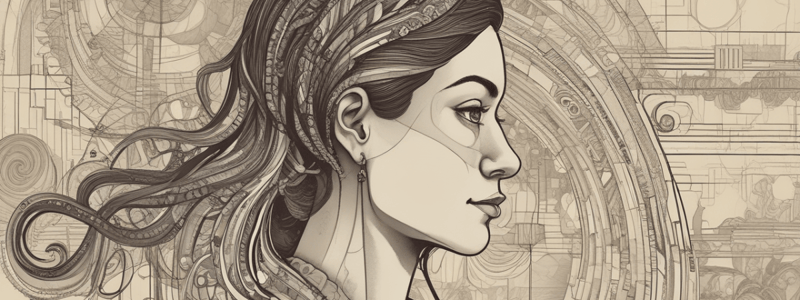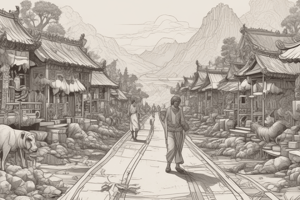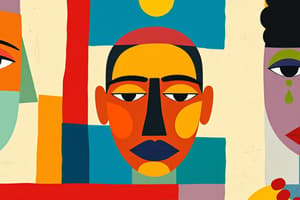Podcast
Questions and Answers
What happened to the birds with long, thin beaks after the drought?
What happened to the birds with long, thin beaks after the drought?
- They started to eat seeds before the drought
- They were less adapted to their environment
- They were more likely to survive and reproduce (correct)
- They became extinct
What is true about cultural universals?
What is true about cultural universals?
- They are common practices and beliefs shared by all human cultures (correct)
- They are only found in modern societies
- They are found in some human cultures but not others
- They are unique to each culture
What helped to shape human immune systems?
What helped to shape human immune systems?
- The transition from hunter-gatherer to agricultural societies (correct)
- The evolution of language
- The development of medicine
- The invention of partnership ceremonies
What is true about northern Europeans and lactose intolerance?
What is true about northern Europeans and lactose intolerance?
What is the focus of evolution when considering social behavior?
What is the focus of evolution when considering social behavior?
What is culture primarily composed of?
What is culture primarily composed of?
What is the primary mechanism by which culture is learned?
What is the primary mechanism by which culture is learned?
Who is credited with developing the Theory of Evolution?
Who is credited with developing the Theory of Evolution?
What is the primary factor that drives the adaptation of species to their environments?
What is the primary factor that drives the adaptation of species to their environments?
What is the result of the natural variation in beak size among finches on an island?
What is the result of the natural variation in beak size among finches on an island?
What is the main reason why the long-beaked birds are more likely to survive and reproduce?
What is the main reason why the long-beaked birds are more likely to survive and reproduce?
What is the main idea behind Darwin's realization?
What is the main idea behind Darwin's realization?
What is an example of a cultural universal?
What is an example of a cultural universal?
How did the transition from a hunter-gatherer society to one that plants and raises crops affect human populations?
How did the transition from a hunter-gatherer society to one that plants and raises crops affect human populations?
What is the reason why northern Europeans are able to digest lactose?
What is the reason why northern Europeans are able to digest lactose?
What is the primary reason why certain physical attributes or behaviors are selected for in a population?
What is the primary reason why certain physical attributes or behaviors are selected for in a population?
What is the implication of the fact that certain behaviors or practices are present in all human cultures?
What is the implication of the fact that certain behaviors or practices are present in all human cultures?
How does the environment influence the evolution of a species?
How does the environment influence the evolution of a species?
What is the relationship between culture and human evolution?
What is the relationship between culture and human evolution?
What is the significance of the transition from a hunter-gatherer society to one that plants and raises crops?
What is the significance of the transition from a hunter-gatherer society to one that plants and raises crops?
Flashcards are hidden until you start studying
Study Notes
Culture and Evolution
- Culture refers to customs, knowledge, and behaviors learned and socially transmitted, including ideas, values, and objects meaningful to a group of people.
- Culture is typically learned through observation and interactions with others, but it also has a biological component shaped by evolution.
Theory of Evolution
- The Theory of Evolution was proposed by Charles Darwin, who observed that small variations in species occur over different locations.
- Example: finches on different islands have different beak sizes, with short beaks on one island and long beaks on another.
Evolution and Adaptation
- The animals best suited for their environment are more likely to survive and pass on their genes.
- Example: finches with long beaks are better adapted to reach seeds in flowers with long petals after a drought, increasing their chances of survival and reproduction.
Evolution and Culture
- Certain behaviors can be selected for if they contribute to the fitness of the species.
- Cultural universals are common practices and beliefs shared by all human cultures, such as medicine, partnership ceremonies, funeral ceremonies, language, and communication.
- The existence of cultural universals suggests that they may have been selected for during human evolution.
Culture and Human Evolution
- The transition from hunter-gatherer societies to agriculture and domestication led to population growth and increased exposure to disease outbreaks.
- As a result, human immune systems have been shaped by cultural practices.
- Example: northern Europeans who descended from cattle-rearing cultures have evolved to digest lactose in milk, allowing them to survive and reproduce in environments with limited nutrition.
Culture and Evolution
- Culture refers to customs, knowledge, and behaviors learned and socially transmitted, including ideas, values, and objects meaningful to a group of people.
- Culture is typically learned through observation and interactions with others, but it also has a biological component shaped by evolution.
Theory of Evolution
- The Theory of Evolution was proposed by Charles Darwin, who observed that small variations in species occur over different locations.
- Example: finches on different islands have different beak sizes, with short beaks on one island and long beaks on another.
Evolution and Adaptation
- The animals best suited for their environment are more likely to survive and pass on their genes.
- Example: finches with long beaks are better adapted to reach seeds in flowers with long petals after a drought, increasing their chances of survival and reproduction.
Evolution and Culture
- Certain behaviors can be selected for if they contribute to the fitness of the species.
- Cultural universals are common practices and beliefs shared by all human cultures, such as medicine, partnership ceremonies, funeral ceremonies, language, and communication.
- The existence of cultural universals suggests that they may have been selected for during human evolution.
Culture and Human Evolution
- The transition from hunter-gatherer societies to agriculture and domestication led to population growth and increased exposure to disease outbreaks.
- As a result, human immune systems have been shaped by cultural practices.
- Example: northern Europeans who descended from cattle-rearing cultures have evolved to digest lactose in milk, allowing them to survive and reproduce in environments with limited nutrition.
Culture and Evolution
- Culture refers to customs, knowledge, and behaviors learned and socially transmitted, including ideas, values, and objects meaningful to a group of people.
- Culture is typically learned through observation and interactions with others, but it also has a biological component shaped by evolution.
Theory of Evolution
- The Theory of Evolution was proposed by Charles Darwin, who observed that small variations in species occur over different locations.
- Example: finches on different islands have different beak sizes, with short beaks on one island and long beaks on another.
Evolution and Adaptation
- The animals best suited for their environment are more likely to survive and pass on their genes.
- Example: finches with long beaks are better adapted to reach seeds in flowers with long petals after a drought, increasing their chances of survival and reproduction.
Evolution and Culture
- Certain behaviors can be selected for if they contribute to the fitness of the species.
- Cultural universals are common practices and beliefs shared by all human cultures, such as medicine, partnership ceremonies, funeral ceremonies, language, and communication.
- The existence of cultural universals suggests that they may have been selected for during human evolution.
Culture and Human Evolution
- The transition from hunter-gatherer societies to agriculture and domestication led to population growth and increased exposure to disease outbreaks.
- As a result, human immune systems have been shaped by cultural practices.
- Example: northern Europeans who descended from cattle-rearing cultures have evolved to digest lactose in milk, allowing them to survive and reproduce in environments with limited nutrition.
Studying That Suits You
Use AI to generate personalized quizzes and flashcards to suit your learning preferences.




